Good morning!
Greetings in the name of the father, the son, and the Holy Spirit.
Rejoice always, pray continually, give thanks in all circumstances; for this is God’s will for you in Christ Jesus. (1 Thessalonians 5:16-18)
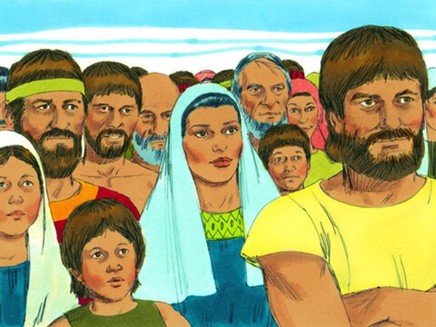
…
The Israelites complained to Moses. Then they spit out the water drawn from the oasis they found after three days’ journey through the desert. They refused to drink the water because the taste of the water was bitter. How bitter was it? The three-day journey through the desert was not enough to make them drink the water while overcoming the bitterness of the water. The taste of the water must be really bitter.
Only three days ago, the Israelites crossed the Red Sea through the water by walking on dry ground. It was a lifetime experience that they never forget. Before crossing the Red Sea,they thought that they were killed by the Pharaoh’s army because they chased down the Israelites. The Pharaoh’s army was the finest among all Egyptian armies, equipped with the best weapon of the time: the Egyptian Chariots.
On the other hand, the Israelites were ex-slaves who had no weapon to fight against the Pharaoh’s best Egyptian army. None was trained to fight or defend themselves. They just worked for the Egyptians as slaves. They were born as slaves, lived as slaves, and died as slaves. Their lives were nothing but lowly, powerless slaves.
Pharaoh, the king of Egypt, himself led the army. Why? He had just freed the Israelites from their slavery and let them go because God punished Pharaoh and all Egyptians ten times with ten plagues. The tenth plague was a truly fearful one. The last plague killed his firstborn son, along with all firstborn sons of the rest of the Egyptians. In fear, Pharaoh let the Israelites go.
But Pharaoh quickly realized that his country could not sustain itself without the Israelites. The entire economy depended on the Israelites’ slave labor. Without the Israelites, his country, Egypt, was on the verge of collapse. Of course, he had no backup plan at all. His high-rank officials also expressed the same concern.
Thus, Pharaoh changed his mind. “What have we done, letting all those Israelite slaves get away?” Pharaoh asked. So Pharaoh harnessed his chariot and called up his troops. He took with him 600 of Egypt’s best chariots, along with the rest of the chariots of Egypt, each with its commander. He chased after the people of Israel, who had left with fists raised in defiance.
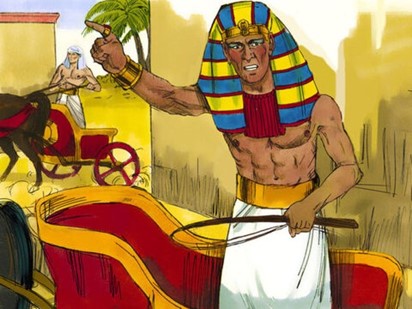
The Egyptians chased after them with all the forces in Pharaoh’s army—all his horses and chariots, his charioteers, and his troops. The Egyptians caught up with the people of Israel as they camped beside the shore of the Red Sea after leaving Egypt.
It was a matter of time before Pharaoh, and his army caught up with the Israelites. The Israelites saw the coming of the Pharaoh’s army, the most formidable army at that time, and they were all terrified. They thought Pharaoh’s army was running into them and would kill them. However, it was not true. It was the Israelites’ manufactured perception driven by fear. Indeed, Pharaoh simply wanted to take the Israelites back to Egypt as slaves.
The Israelites tried to run away from the Pharaoh’s army, but the Red Sea blocked their way because they camped beside the shore. The Israelites realized they were trapped between the Pharaoh’s army and the Red Sea. Then they concluded that all would perish by the Pharaoh’s army.
The Israelites were all panicked. They accused and blamed Moses, “Why did you bring us out here to die in the wilderness? Weren’t there enough graves for us in Egypt? What have you done to us? Why did you make us leave Egypt? Didn’t we tell you this would happen while we were still in Egypt? We said, ‘Leave us alone! Let us be slaves to the Egyptians. It’s better to be a slave in Egypt than a corpse in the wilderness!’”
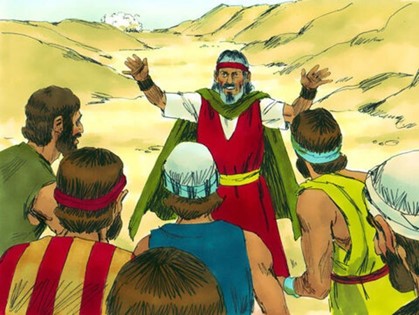
The Israelites’ complaint was not true. When we are in fear, our perception becomes distorted. Yes, the Israelites could not think clearly at that time because of the fear of the Pharaoh’s army. The fear of the Israelites was simply making up a completely bogus reality, which made them even more irrational. Fear, distorted perception, irrationality, and irrationality made them more fearful. They were also mentally trapped in a vicious cycle.
Were the Israelites particularly more irrational than us? No, it happens to all human beings when driven by fear. Then we all become irrational and reach a wrong conclusion, which is often the worst. Then we panic. Of course, it does not help at all but aggravates more while making the situation worse to worst
Of course, none wanted to die in the middle of the wilderness. Then they complained. But their fear of death was ungrounded. By the way, where was their thanksgiving and faith in God? When they came out of Egypt, they praised Moses and God. It was a few days ago.
Indeed when they left Egypt, they expected no more misery. But they saw the Pharaoh’s army chasing them. Suddenly, they felt a life-threatening danger of being killed, which made them all irrational. Then rather than keeping faith in God, they chose Pharaoh.
Again, when we are driven by fear, we become irrational. Therefore, no matter what happens in our lives, we should not be driven by fear. The Israelites were driven by fear, not in faith in God.
Therefore, what shall we do when we realize that something fearful is quickly coming at us? Here is the answer: we should be in faith in God by not fixing our eyes on the fearful thing, but focusing on God, our Ever-Loving Father. Why? If we fix our eyes on something fearful, it will quickly occupy us and make us completely irrational, which makes us even more fearful. Then it will lead to our complete breakdown.
Peter was one of Jesus’ disciples. One evening, Peter and the rest of Jesus’ disciples sailed off the other side of the Sea of Galilee. As the sun set and the darkness fell, the wind started. It quickly became a strong wind that rocked the boat. They tried everything to save them from the storm, but nothing worked. They kept doing everything to keep them alive in the middle of the storm, but they were losing. The boat was getting water, and they felt that all would die. All disciples shouted, but there were in the middle of the stormy sea. Nobody could save them. By the way, they were all experienced fishermen who spent their entire lives in the Sea of Galilee, but the particular night storm was different. It was more than what they could deal with. They realized they were completely helpless. They thought that they all would die.
Then, they suddenly saw something approaching. They thought that they saw a ghost. They screamed, but it was Jesus. Jesus immediately calmed them down. All were truly amazed at Jesus walking to them on the stormy water. Suddenly, Peter shouted to Jesus that he wanted to walk on water as Jesus did. Then Jesus said, “Come!” Peter immediately jumped off the boat into the stormy water because he believed in Jesus. In faith, Peter was also walking on the stormy water like Jesus. The rest of the disciples were truly amazed. Both Jesus and Peter were walking on the stormy water.
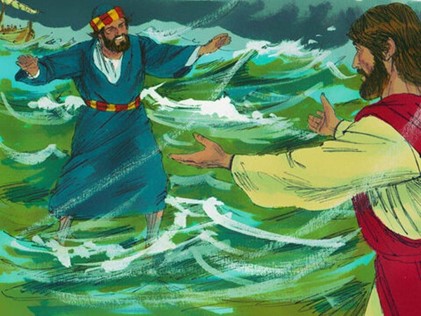
Peter kept fixing his eyes on Jesus and walked toward Jesus, and Jesus walked toward Peter with his wide-open arms. Peter saw Jesus’ open arms, and he was joyfully walking toward Jesus. All things were good so far, but suddenly a big wave came. As it quickly approached Peter, Peter took off his eyes from Jesus and watched the big wave. Then he became fearful. Soon Peter realized that he was quickly sinking deep into the water. Nothing was changed. Jesus was still there with Peter, but Peter was sinking. Peter screamed for help, and Jesus immediately grabbed Peter to keep him from sinking. Then Peter removed his eyes from the storm and again saw Jesus. He could see Jesus Christ’s eyes full of compassion and love, and Peter realized that he was safe again. He was in Jesus’ powerful and merciful arm.
Peter learned a great lesson. Fearing the big wave made him sink. The big wave could not harm Peter because Jesus was with Peter even in the middle of the storm. Yes, Jesus was with Peter all the time. Anything changed? No. Only was the change that Peter took off his eyes from Jesus. Then Peter quickly sank and shouted. Then Jesus grabbed Peter to keep Peter from sinking. In reality, even before Peter shouted at Jesus, Jesus was moving toward Peter to grab him quickly, who was about to sink quickly deep into the water. Jesus knew Peter’s little faith.
Jesus immediately reached out and grabbed him. “You have so little faith,” Jesus said. “Why did you doubt me?” (Matthew 14:31)
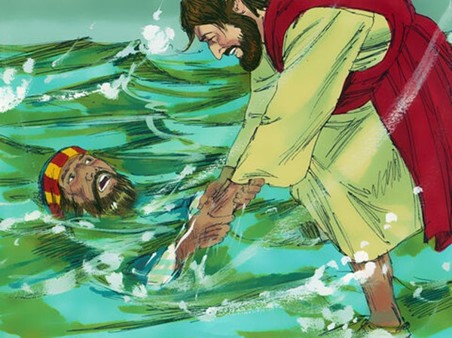
We are God’s children, whom God loves always. God always watches over us as the apple of His eye without ceasing. Even in the middle of our life storms, God is with us. Yes, something truly fearful might come at us, but it cannot hurt us. Why? God stands right next to us and holds our hands whether we recognize His hand or not, whether we are making an irrational decision or not because of fear.
God is always with us and watches over us because we are His children, and God loves us. Then what does God really want from us? It is our faith to recognize His presence even in our life storms and be calm and at peace with him while trusting in Him 100%.
Also, please remember God knows our weaknesses. When we cannot be calm and in peace with God, He holds our hands tightly. One thing that God wants is to fix our eyes on God and grab Him ever stronger. Then God wants us to grow deeper into Him by increasing our faith while trusting Him under all circumstances.
The Israelites complained to Moses while making up a fear-driven worst-case story, which was not true. Even so, God was right next to them. Indeed, God let them complain as much as possible. Sometimes, we parents allow our children to complain as much as they want. Then later, they realize by themselves how much they were wrong. God allowed the Israelites to complain. By doing so, they would learn their sin of complaining to God, and they would not forget forever.
Then God spoke through Moses, who 100% trusted God, “Don’t be afraid. Just stand still and watch the LORD rescue you today. The Egyptians you see today will never be seen again. The LORD himself will fight for you. Just stay calm.” It was not a statement made by Moses as an ordinary human being but a great confession of his faith in God.
Wasn’t Moses in fear? Yes, Moses also feared the Pharaoh’s army quickly approaching him, but Moses could overcome the fear in faith.
How did Moses overcome the fear? The fear fled when he prayed to God while trusting in Him 100%. He presented all, including his fear of the Pharaoh’s army, in prayer to God. Indeed, his prayer was the triumphant moment of his walk with God for 40 years of his life.
They must be committed to the mystery of the faith now revealed and must live with a clear conscience. (1 Timothy 3:9)
When Moses prayed and boldly professed his faith, God responded. God did something unthinkable. God opened a path through the Red Sea and let the Israelites walk through the Red Sea on dry ground. All of the complaints immediately stopped as if none of them was there at all.
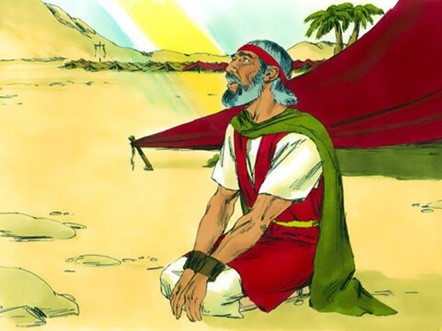
What can you see here? When the Israelites were freed from slavery and left Egypt, they praised God and Moses, but when they saw the Pharaoh’s army with fearful eyes, they quickly against Moses and complained to God. They even praised the slave life in Egypt. They beautified and told a completely wrong story about their slavery as their happy and enjoyable life in Egypt. But we know all were made-up stories in fear-driven irrationality.
If their stories were true, would they have ever left Egypt? No. Instead, they objected to Moses when Moses said, “Leave Egypt because you are no longer slaves in Egypt.” There was no evidence that they opposed Moses and refused to leave Egypt.
Let’s question ourselves. Are we really different from the Israelites? Sadly no! When a fearful thing comes at us, we are driven by fear like the Israelites and make a wrong decision. Instead, as something fearful approaches us, we should quickly and firmly fix our eyes on God, and present all things to God, including our fears, and doubts, with our truly contrite hearts, then, we can overcome the fear with the power only coming from God. By the way, it requires our absolute humility before God in faith.
Then the Israelites safely crossed the Red Sea and arrived at the other side, but the Pharaoh’s army tested God by chasing down the Israelites to the middle of the Red Sea and was completely destroyed by the power of God. The waters returned and covered all the chariots and charioteers—the entire army of Pharaoh. Of all the Egyptians who tested God and chased down into the sea, all perished, and not a single one survived. Their bodies were washed up on the seashore. The Israelites experienced and eyewitnessed God’s power and His salvation.
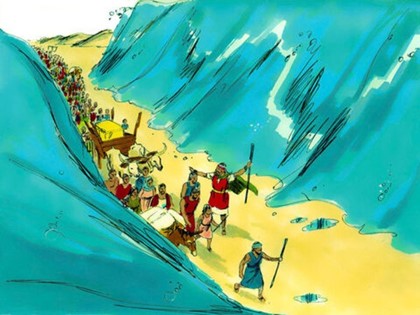
Then the Israelites gave all praises that they could give to God and Moses. It was their life experience that they could not forget forever. They all said their unforgettable experience to each other because it was the day of salvation. Finally, they eyewitnessed they would not see the Pharaoh’s army forever. They joyfully left the place singing and praising God. They faithfully followed Moses as Moses led them, who was absolutely obedient to God.
They walked three days through the desert. All of the water with which they brought was used up. They were increasingly thirsty. Moses prayed to God. Many of the Israelites also prayed for water. The sun was hot, and the desert was bone-dry. Some of them fainted, and people carried them. The situation quickly worsened, and many thought they would die without water.
Moses and many prayed for water. On the third day, they found an oasis. All felt that finally, God answered their prayers. All became extremely happy because of the oasis. Many ran to the oasis to get the water. As soon as they reached the oasis, they saw a pool of water waiting for them. Those who arrived ahead of the rest hurriedly drew the water from the oasis. Then they put it in their mouth to quench their thirst. Immediately, they spit out the water from their mouths. The water was too bitter to drink. What a tragic scene it was! All of their prayers turned out to be nothing but bitter water, which they could not drink.
Yes, the water was too bitter to drink. But although the taste of the water was bitter, it was still water. If the Israelites were truly dying out of thirst, wouldn’t they drink the water regardless of the taste?
The Israelites complained, not because there was no water, but because the water tasted bitter. How about us? Have we complained to God because what God gave us did not fit our taste?
How about us? If our life taste was good, then we thanked God. If our life taste was bitter, haven’t we complained as the Israelites did?
What can we conclude from what the Israelites did? They still had enough strength and their own selves to complain to God. Thus, they refused to receive what God provided with thanks regardless of the taste of what God provided.
Yes, it is understandable. The bitter taste was too strong to drink the water. God provided than their thirst at the moment. In other words, they felt that they could survive longer without water. Then they whined and demanded what they liked to have, which fit their taste. If they were literally dying without water, wouldn’t they have drunk the water without a single complaint?
Moses was different. He was watching the response of the Israelites, and he was frustrated with the people’s behavior. God provided water, but the Israelites refused to drink it because of its taste. What could Moses do at that time? Prayer. Yes, Moses humbly prayed for the Israelites complaining and whining. The Israelites refused to drink the water due to the taste, but Moses humbly presented the situation to God while trusting in God 100%. Then God showed a piece of wood. Moses threw it into the water, and this made the water sweet to drink. The taste of the oasis water became what they preferred to have.
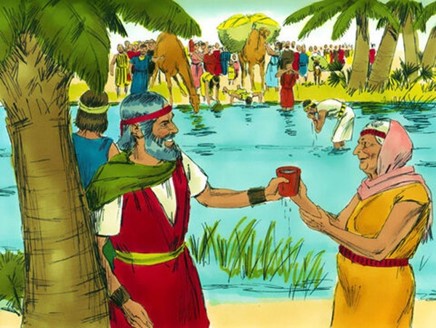
How many times have we behaved like the Israelites? We prayed, and God answered our prayer. Then we tasted God’s answer first, whether it fits our taste or not. If the taste was not what we wanted, then didn’t we complain to God? Shouldn’t we give thanksgiving to God first, regardless of taste? No, we always check the taste first, whether God provides what we prayed exactly or not. If not, haven’t we complained?
The Israelites eyewitnessed God’s ten plagues that utterly punished the Egyptians. Then they experienced the joy of exiting Egypt and the unforgettable God’s miracle of passing through the Red Sea by walking on dry ground. Then they watched God’s final judgment of killing the Pharaoh’s army, chasing down the middle of the Red Sea following the Israelites by making returning the Red Sea over them. Thus, none survived. Haven’t they seen and experienced God and God’s power enough? Even so, they were quick to complain to God not because God did not provide at all but because what God provided did not fit their taste.
By the way, if we were there with the Israelites, could we be different? Please ponder this question throughout this week.

My old self has been crucified with Christ. It is no longer I who live, but Christ lives in me. So I live in this earthly body by trusting in the Son of God, who loved me and gave himself for me. (Galatians 2:20)
